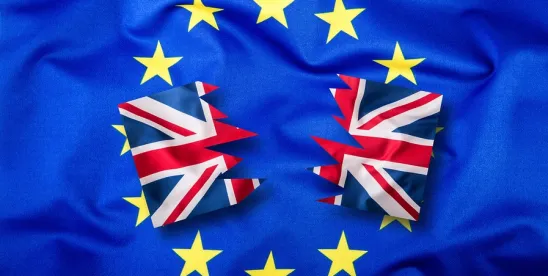As expected, the market access to the EU for UK financial services firms has changed post-Brexit. As of 1 January 2021, UK financial services firms that intend to do business in the EU can no longer rely on the EU Single Market to offer their services using the EU passporting system. Therefore, the implications of the Trade and Cooperation Agreement (“Agreement“) for financial services are more severe than for example trade, and the effects come close to that of a hard Brexit.
The Agreement deals with market access for financial services firms in a similar way to other EU Foreign Trade Agreements with third countries in that they must comply with EU legal obligations on market access, including authorisation requirements and supervision.
Equivalence Decisions
The Agreement does not provide for any decisions under equivalency frameworks for the financial services industry (“Mutual Recognition Regime“) which was previously discussed in the course of Brexit negotiations. Under such Mutual Recognition Regime access could have been provided for a broad range of financial services.
Generally, existing legislative frameworks in both the EU and UK allow for third countries to be assessed as having “equivalent” legislative safeguards and standards. Where such a decision is reached, market access arrangements open up for firms to do cross-border business between the EU or UK and those third countries. From 1 January 2021, the UK will be considered a third country under EU law. Similarly, the UK will consider the EU Member States as third countries for the purposes of market access. Notably, a wide range of laws regulates financial services in the EU and only a few contain equivalence regimes, which enable third country firms to provide services to local counterparties in the EU without local authorization. The ability of UK firms to operate in the EU under equivalency decisions and vice versa is much more limited than under the previous pass porting regime.
Importantly, the companies relying on equivalence need to be aware that equivalence decisions can be unilaterally revoked and where this is the case, businesses will need to comply with the general legal obligations on market access again.
There are around 40 areas where the EU may consider the UK regulatory framework as equivalent in respect to financial services. In September 2020, the EU Commission made one such decision in respect to central counterparties (CCPs). ESMA adopted decisions that the three UK based CCPs should be recognised as third country Central Counterparties (CCPs). As CCPs, they will continue to be eligible to provide their services in the EU after 31 December 2020.
In November 2020, UK Treasury announced that the UK would be granting a package of equivalence decisions to EU Member States for certain intragroup transactions, regulated markets, market-making exemptions from short selling restrictions, the certification for credit rating agencies and under the Benchmarks regulation. These equivalency decisions came into effect on 1 January 2021. In addition, the EU Commission has assessed the UK’s replies to the EU Commissions equivalence questionnaires in 28 areas. The EU Commission has stated that a series of further clarifications are needed on how UK will diverge from EU frameworks post-Brexit, how it will use its supervisory discretion regarding EU firms and how the UK’s temporary regimes will effect EU firms before equivalence determinations can be decided in those outstanding 28 areas after 31 December 2020 and so, accordingly, cannot finalize its assessment at this time.
Notably, the EU Commission has taken note of the UK’s announcement in November 2020 on the HM Treasury’s powers to make equivalence decisions, which note that equivalence determinations are to be considered when they are in the UK’s interest. Similarly, the EU will consider equivalence when they are in the EU’s interest.
General Rules under the Agreement
Under the Agreement the UK and the EU are bound by certain general rules concerning financial services. The following Articles of the Agreement describe the future relationship between EU and UK financial services:
-
Article SERVIN.5.41 – International Standards
Under this article, both the EU and UK are working towards the incorporation of internationally agreed standards in the financial service sector for regulation and supervision which include those adopted by the G20; the Financial Stability Board; the Basel Committee on Banking Supervision; the International Association of Insurance Supervisors; the International Organisation of Securities Commissions; the Financial Action Task Force; and the Global Forum on Transparency and Exchange of Information for Tax Purposes of the Organisation for Economic Cooperation and Development.
-
Article SERVIN.5.42 – Financial services new to the territory of either the EU or UK
This article sets out the crux of market access rights and states that the EU or UK shall permit new financial services to their territory if it would have been permitted under its own laws such that new laws do not need to be adopted and/or existing law does not need to be amended.
Together with this article, Article SERVIN.2.2 and 3.2 confirms that no limitations may be imposed on the number of service suppliers, the total of service transactions or assets and the total number of service operation or on the quantity of service output.
-
Article SERVIN.5.43 – Self-regulatory organisations
Under this article, where either the EU or UK (either being a “Party“) requires membership, participation or access to any self-regulatory organisation in order for financial service suppliers of the other Party to supply financial services in its territory, that Party shall ensure compliance by the self-regulatory organisation of the obligations of national treatment (Articles SERVIN 2.3 and 3.4) and most favoured nation treatment (Articles SERVIN 2.4 and 3.5).
-
Article SERVIN.5.44 – Clearing and payment systems
Article SERVIN.5.44 allows access to payments and clearing systems that are operated by public entities and official funding and refinancing facilities shall be made available to financial services firms established in the territory of the other Party. However it does not discuss access to the EU or UK lender of last resort facilities. Further, each Party shall permit a financial service supplier of the other Party established in its territory to supply any new financial service that it would permit its own financial service suppliers to supply in accordance with its law in like situations, provided that the introduction of the new financial service does not require the adoption of a new law or the amendment of an existing law. This does not apply to branches of the other Party established in the territory of a Party.
While these rules provide for a much more liberal market access between the EU and the UK for financial services than what would have been provided under World Trade Organisation (“WTO“) terms or the General Agreements on Trade in Services (“GATS“) rules if there was a no-deal Brexit, the Agreement is still not comparable to the rules of the EU Single Market. Trading on WTO terms is underpinned by two key principles of non-discrimination:
-
Most-favoured nation (MFN) principle– in the absence of an FTA between two or more WTO members, countries cannot discriminate between their trading partners. For example, if Country A allows Country B to have preferential treatment (e.g. through a 5% reduction in their tariffs for agricultural products), unless an exemption applies, Country A would be required to afford all other WTO members with the same tariff reduction.
-
National treatment (NT) principle– when goods or people from another WTO member state enter the territory of a member state, they must be treated in the same way as domestic goods and local people. For example, if Country A provides tax breaks for its struggling domestic automotive industry, all automotive companies that have operations in Country A will be entitled to such tax breaks, regardless of whether the company is domestic or foreign i.e. from Country B.
The GATS applies in principle to all service sectors, with two exceptions:
-
Article I (3) of the GATS excludes “services supplied in the exercise of governmental authority”. These services are supplied neither on a commercial basis nor in competition with other suppliers. Cases in point are social security schemes and any other public service, such as health or education that is provided at non-market conditions.
-
Furthermore, the Annex on Air Transport Services exempts from coverage measures affecting air traffic rights and services directly related to the exercise of such rights.
Under the WTO terms the UK would become a “third country”, which means that the import and export of goods and services between the EU to the UK will face new customs and regulatory barriers and in addition, the UK would lose the benefits of FTAs between the EU and third countries which have not been ‘rolled over’ (which currently includes Mexico and Canada).
The main reason for this is that the EU and UK agreed on a prudential carve-out in the Agreement.
The Prudential Carve-Out
The Prudential Carve-Out (“PCO“) essentially allows members of the WTO to adopt the measures they deem appropriate for prudential reasons when regulating trade in financial services. The EU and UK therefore both preserve their right to adopt or maintain measures for prudential reasons under Article SERVIN.5.39, including preserving financial stability and the integrity of financial markets.
Under Article SERVIN.5.39, the EU and the UK may therefore unilaterally set, for example, the requirement of prudential authorizations, notifications and ongoing supervision in their respective jurisdictions. This can restrict the trade-enabling function of the Agreement for financial services significantly.
Joint Declaration
Further to the Agreement, the UK and the EU have made a Joint Declaration on Financial Services Regulatory Cooperation (“Joint Declaration“) by which both “agree to establish structured regulatory cooperation on financial services, with the aim of establishing a durable and stable relationship between autonomous jurisdictions.”
The Joint Declaration is “based on a shared commitment to preserve financial stability, market integrity, and the protection of investors and consumers” and these arrangements will allow for:
-
bilateral exchanges of views and analysis relating to regulatory initiatives and other issues of interest;
-
transparency and appropriate dialogue in the process of adoption, suspension and withdrawal of equivalence decisions; and
-
enhanced cooperation and coordination including in international bodies as appropriate.
Under the Joint Declaration, both the EU and UK will, by March 2021, agree on a Memorandum of Understanding (“MoU“) establishing the framework for this cooperation. They will discuss how to move forward with equivalence determinations between the EU and UK, without prejudice to the unilateral and autonomous decision-making process of each side.
Until then, access of service providers to the EU and UK financial services market is no longer possible under EU passporting rights. Compliance with the local legal obligations on market access, including authorization requirements and supervision, is needed to continue business.




 />i
/>i
